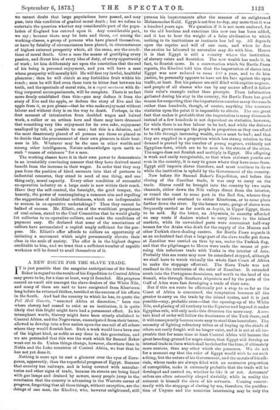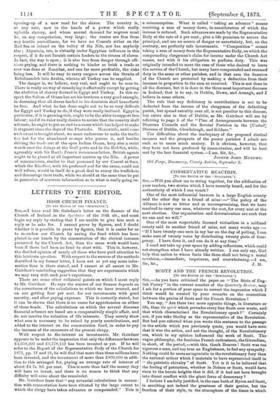A NEW ROUTE FOR THE SLAVE TRADE.
T is just possible that the sanguine anticipations of Sir Samuel 1 Baker in regard to the results of his Expedition to Central Africa may prove to be, for a time at least, very ill founded. His progress caused no small stir amongst the slave-dealers of the White Nile, and many of them are said to have emigrated from Khartoum long before he returned thither, terrified at the success of his efforts in the South. And had the country to which he has, to quote the Pall Mall Gazette, " annexed Africa at discretion," been one -where slavery had ceased to exist as an institution, it is quite -likely that this fright might have had a permanent effect. In his triumphant words, Slavery might have been utterly abolished in Central Africa, and the Negro races, emancipated from their'terror, allowed to develop into a free nation upon the one soil of all others where they would flourish best. Such a work would have been one of the highest kind, as noble as any done in this generation, and we are persuaded that this was the work which Sir Samuel Baker went out to do. Unless things change, however, elsewhere than in Nubia and the Lake countries of Central Africa, we fear that he .has not yet done it.
Nothing is more apt to cast a glamour over the eyes of Euro- peans, apparently, than the superficial progress of Egypt. Because that country has railways, and is being covered with manufac- tories and other signs of trade, because its streets are being lined with gas lamps and drained by sewers, many people jump to the conclusion that the country is advancing in the Western career of progress, forgetting that all these things, without exception, are the doings of one man, the Khedive, who, however enlightened, still pursues his improvements after the manner of an enlightened Mohammedan Kalif. Egypt is not free to-day, any more than it was a hundred years ago. We question if it is not more enslaved, for to the old burdens and exactions this new one has been added, and it has to bear the weight of a false civilisation to which nothing in its institutions or instincts has led up. All depends upon the caprice and will of one man, and when he dies the exotics he laboured to naturalise may die with him. Hence it is that Egypt is still a country where the institution of slavery exists and flourishes. The new wealth has made it, in fact, to flourish more. In a conversation which Sir Bartle Frere reports, the Khedive told him that the importation of slaves into Egypt was now reduced to some 400 a year, and to do him justice, he personally appears to have set his face against the open traffic, at least. But his palaces are still filled with captive negroes, and people of all classes who can by any means afford it follow their ruler's example rather than precepts. From information gathered during his stay in the country, Sir Bartle Frere has good reason for suspecting that the importations number many thousands rather than hundreds, though, of course, anything like accurate statistics upon the point it is impossible to obtain. The one great fact that makes it probable that the importation is many thousands instead of a few hundreds is not dependent on statistics, however, for while there is no free labour to be had, and while the distaste for work grows amongst the people in proportion as they can afford to be idle through increasing wealth, slaves must be had ; and that they are supplied in a proportion which has strong relation to the demand is proved by the number of young negroes, evidently not Egyptian-born, which are to be seen in the streets of the cities. The negro does not flourish and multiply in Egypt. His offspring is weak and easily recognisable, so that when stalwart youths are seen in the country, it is easy to guess where they have come from. Egypt still imports slaves therefore, and must continue to do so while the institution is upheld by the Government of the country.
Now before Sir Samuel Baker's Expedition, and before the closing of the Zanzibar trade, it was easy to carry on the trade. Slaves could be brought into the country by two main channels, either down the Nile valleys direct from the interior, or round the coast to some port in the Red Sea, whence they would be carried overland to either Khartoum, or to some place farther down the river. By the former route, gangs of slaves were frequently carried as far north as Asyiit, in Upper Egypt, there to be sold. By the latter, an Abyssinia in anarchy afforded an easy route if dealers wished to carry slaves to the inland markets, while its unwatched ports were convenient half-way houses for the Arabs who dealt for the supply of the Meccan and other Turkish slave-dealing centres. Sir Bartle Frere regards it as an undoubted fact that a large part of the slave traffic put down at Zanzibar was carried on thus by sea, under the Turkish flag, and that the pilgrimages to Mecca were made the means of pur- suing this nefarious trade with Turks in the interior of Asia. Probably this sea route may now be considered stopped, although we shall have to watch virtually the whole East Coast of Africa to make the stoppage effectual. The Slave Trade was not confined to the territories of the ruler of Zanzibar. It extended south into the Portuguese dominions, and north to the land of the Somali, who through Southern Abyssinia and by the ports of the Gulf of Aden were fast, developing a trade of their own.
But if this sea route be effectually put a stop to so far as the Coast of Africa is concerned, the temptation becomes all the greater to carry on the trade by the inland routes, and it is just possible—nay, probable even—that the opening-up of the White Nile, and placing of all territory to the Equator and beyond it under Egyptian rule, will only make this diversion the more easy. A cer- tain kind of order will follow the dominance of the Turk there, and it will consequently become more easy to steal than heretofore. The necessity of fighting refractory tribes or of buying up the chiefs of others not easily fought will no longer exist, and it is not at all iin- proable that for some time at least Central Africa will become the great breeding-ground for negro slaves, that Egypt will develop an internal trade in them which shall be richer for the time, if ultimately more noxious, than any other which she possesses. We do not for a moment say that the ruler of Egypt would wish to see such a thing, but the nature of his Government, and the morals of his offi- cials, whose ranks are always filled with an enormous proportion of corruptibles, make it extremely probable that the trade will be developed and carried on, whether he like it or not. Autocrats' orders are often ostensibly obeyed slavishly, while in reality the autocrat is himself the slave of his servants. Coming concur- rently with the stoppage of slaving by sea, therefore, the pacifica- tion of Unyoro and the countries intervening may be only the opening-up of a new road for the slaves. The country is, at any rate, now in the hands of a power which really upholds slavery, and whose annual demand for negroes must be, on any computation, very large ; the routes are free from any hostile surveillance, for we have no Consuls either on the Red Sea or inland on the valley of the Nile, nor has anybody else ; Abyssinia, too, is virtually under Egyptian influence in this respect, if it do not furnish certain feeders to the stream of slaves. In fact, the way is open ; it is also free from danger through offi- cious prying, and there is nothing to hinder as brisk a trade as ever was done at Zanzibar, and one far more profitable, the risks being less. It will be easy to carry cargoes across the Straits of Babelmandeb into Arabia, whence all Turkey can be supplied.
The danger is, we believe, very real, and ought to be seen to. There is really no way of remedying it effectually except by getting the abolition of slavery decreed in Egypt and Turkey. In this re- spect the Sultan of Oman has set his brethren a very good example, in decreeing that all slaves landed in his dominion shall henceforth be free. And what he has done ought not to be so very difficult for Egypt and Turkey to do, if they were really inclined. Egypt in particular, if it is growing rich, ought to be the abler to support free labour; and if its ruler really desires to secure that the country shall advance, he ought to put an end to a cause which has helped to make it stagnant since the days of the Pharaohs. Meanwhile, until some such event is brought about, we must endeavour to make the traffic too hot for the abandoned scamps who pursue it, and besides driving the trade out of the open Indian Ocean, keep also a strict watch over the doings at the Gulf ports and in the Red Sea, while, agreeably with Sir Bartle Frere's recommendation, British agents ought to be placed at all important centres up the Nile. A power of manumission, similar to that possessed by our Consul at Suez, which the Khedive, with his professed zeal for the cause, could not well refuse, would in itself do a great deal to annoy the traffickers and discourage their trade, while we should at the same time be put in possession of accurate information as to what is really going on.































 Previous page
Previous page